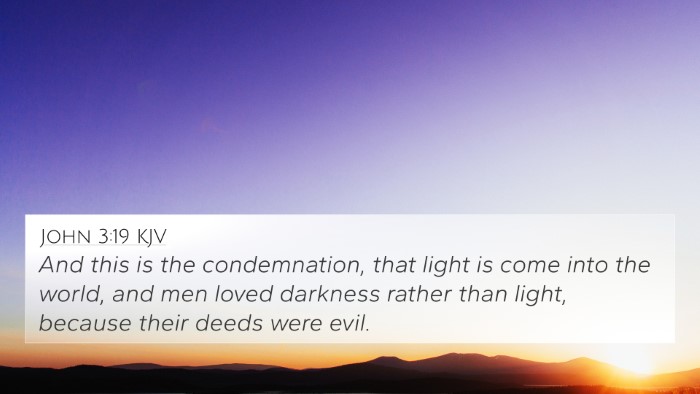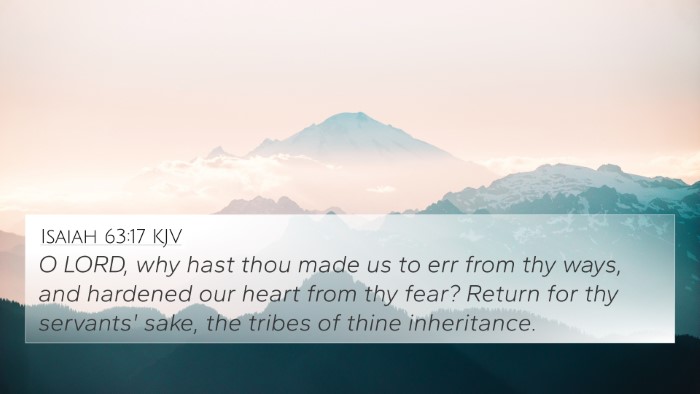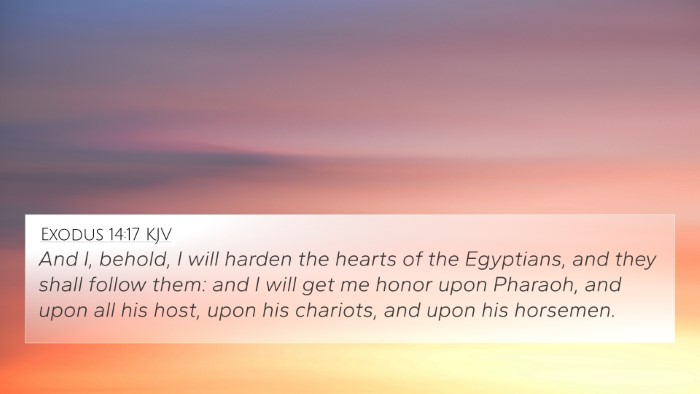Understanding Isaiah 6:10
Verse Reference: Isaiah 6:10
Text: "Make the heart of this people fat, and make their ears heavy, and shut their eyes; lest they see with their eyes, and hear with their ears, and understand with their heart, and convert, and be healed."
Summary of Biblical Meaning
This verse conveys a profound message about spiritual blindness and deafness. God, through Isaiah, is essentially warning that the people's hardened hearts will lead to their inability to comprehend the divine truths being presented to them. This divine response is rooted in the context of judgment—reflecting a tension between God's desire for people to turn to Him and the obstinate nature of their rebellion.
Insights from Commentaries
Matthew Henry: Henry emphasizes that the judgment of hardening hearts can serve as a means of judgment. Those who choose to reject God's revelation will find their understanding dimmed as a result. This also symbolizes how God's light can be hidden from those who refuse it, demonstrating the gravity of spiritual indifference.
Albert Barnes: Barnes provides insight that this verse is about divine judgment on a people who have persistently ignored God's messages. He indicates that the heavy hearts and blind eyes metaphorically illustrate the effects of their ongoing disobedience. Barnes connects this theme to the idea of God's long-suffering nature and how judgment operates in tandem with mercy.
Adam Clarke: Clarke points out that Isaiah's mission was not just to convey messages of hope but also of warning. He stresses that while the call is severe, it highlights the importance of genuine repentance. Clarke's interpretation emphasizes that understanding requires a heart openness which few in Isaiah’s time were exhibiting, thus bringing forth the need for divine intervention for true conversion and healing.
Cross References
- Matthew 13:14-15: These verses echo Isaiah 6:10 by discussing the fulfillment of Isaiah's prophecy regarding people's hearts being hardened, emphasizing the connection between prophecy and its realization in the New Testament era.
- John 12:40: This verse once again references Isaiah’s words, showing how the spirit of blindness continues from the time of the prophets through to Jesus’ ministry.
- Acts 28:26-27: Paul quotes Isaiah to explain the consequences of rejecting the gospel message—reflecting the ongoing theme of spiritual blindness.
- Romans 11:8: Paul refers to the idea of God giving a spirit of slumber, illustrating how spiritual conditions can be a direct consequence of one’s attitude toward divine calling.
- 2 Corinthians 4:4: Here, the concept of spiritual blindness due to resistance toward God is articulated—fitting within the overarching theme of Isaiah 6:10.
- Hebrews 3:15: This verse warns against hardening one’s heart, linking back to the refusal to heed God's message as seen in Isaiah’s time.
- Proverbs 28:9: This passage states that a person who turns away from hearing the law will find their prayers abominable—reflecting the principle of spiritual disconnection from God's truth over time.
- Psalms 95:7-8: These verses call for attentive listening to God's voice, paralleling the need for spiritual responsiveness versus the hardened state found in Isaiah.
- Ezekiel 12:2: Here, God addresses the rebellious house of Israel, indicating their inability to see and hear as consequences of their disobedience.
- Revelation 3:17: The message here about being lukewarm recognizes the idea of negligence toward God's calling—a modern echo of Isaiah's warning.
Conclusion
The message of Isaiah 6:10 emphasizes the dire consequences of spiritual hardness. God’s desire is for His people to truly see, hear, and understand so they can turn back to Him for healing. The cross-references provide a broader context to this verse, showcasing the continuity of this theme throughout scripture—from the Old Testament prophets to the New Testament apostolic teachings.
Exploring Connections Between Bible Verses
Engaging with verses like Isaiah 6:10 alongside their cross-references illustrates the richness of Scripture. By employing Bible cross-reference guides or using Bible concordances, one can delve deeper into the thematic connections between Bible verses, enhancing understanding and interpretation of Biblical texts.
Tools for Bible Cross-Referencing
For those undertaking cross-referencing Bible study methods, numerous tools exist to facilitate understanding. Utilizing a Bible reference resource can unlock the interconnections and deepen one's insight into the rich tapestry of scripture. Familiarizing oneself with these resources can significantly enhance any study of Cross-referenced themes in the Bible.






















